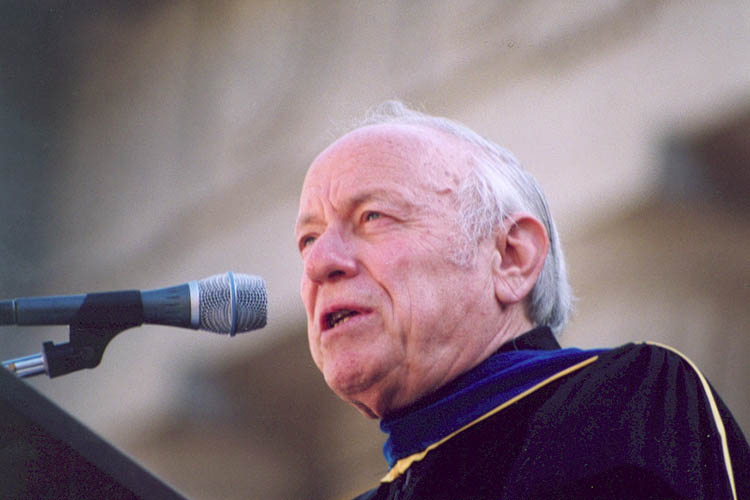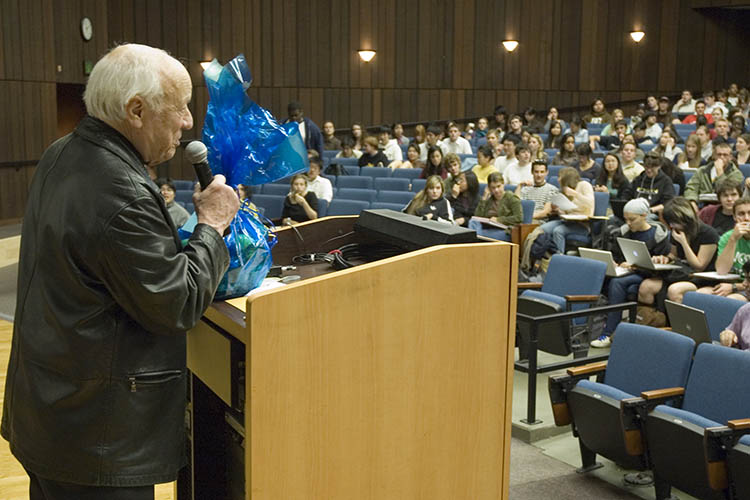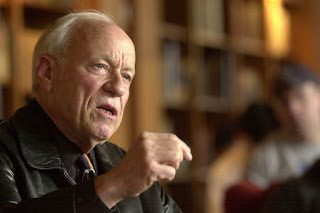Leon Litwack, a legendary American historian who influenced generations of students with his energizing teaching and lectures, passed away on Aug. 5. He was 91.
A world-renowned scholar in U.S. history, Litwack was a staunchly beloved figure at UC Berkeley. The Alexander F. and May T. Morrison Professor Emeritus of American History in the College of Letters & Science, Litwack joined the university’s faculty in 1964 after obtaining his bachelor’s degree and Ph.D. in history from UC Berkeley. Litwack served in this role for more than four decades, receiving two Distinguished Teaching Awards, and reaching more than 30,000 undergraduate students. Litwack’s fierce intellect and spirited passion for history inspired both students and colleagues alike.
“In his classes as in his scholarship, Leon foregrounded the experiences of ordinary people, practicing social history ‘from the bottom up,’ as it was said,” said Cathryn Carson, History Department chair. “He brought history to bear on making the human realities of American life powerfully tangible, compelling us to come to terms with our past and present.”
A passion found early
Litwack often attributed his early interest in history to his upbringing. An only child raised by Russian immigrant parents in Santa Barbara, California, his neighborhood exposed him to a diverse mix of cultures. Litwack found these perspectives to be missing in his early studies, and was troubled by what he viewed as one-sided historical accounts. His 11th grade teacher once remarked that Litwack was “bitterly pro-labor” after he presented a rebuttal of his history textbook to his class. Indeed, Litwack’s political and social views colored his historical point-of-view, which he was eager to explore by the time he joined UC Berkeley in the late 1940s.

Litwack spoke at many graduation exercises and was beloved by the students he taught over his 40-year career. (Photo by Peg Skorpinski)
“At Berkeley, history continued to exert its fascination on me,” Litwack shared in a 2001 interview with History Matters. “Not one but several influences solidified my decision to teach and write American history: my social activism … my trade union membership … and my growing awareness of the uses and abuses of the past, my growing sense of the fundamental contradictions between my country’s often proclaimed ideals and its practices, between its professed egalitarianism and deep inequalities in wealth and in conditions of work and life.”
“My father loved life and he lived it fully,” said his daughter, Ann Litwack. “I remember how he’d receive letters from people all over, thanking him for how much they had learned from him or from his writing. He had so many roles in his life: he was always a wonderful father and husband, and he never stopped caring about teaching.”
‘Fight the Power’
Out of the tremendous legacy that Litwack has imparted to UC Berkeley, he is perhaps best known for his exceptionally popular course that surveyed American history. More than 500 students would enthusiastically gather in Wheeler Auditorium to hear Litwack lecture in a fiery, engaging lecture style, designed to elicit reactions, emotions and, above all else, deep critical thinking. He challenged students to revisit the past with fresh eyes.
“His favorite class was the survey American history course, because he knew that for some students, that class might have been their only exposure to history,” Litwack’s daughter Ann recalled. “He wanted them to dig deeper and he ended up changing their lives.”

Litwack was recognized many times for his outstanding teaching, including the student-selected Golden Apple Award for Outstanding Teaching, which he received in 2007. (UC Berkeley photo by Steve McConnell)
“American history is more than an exercise in self-congratulation and nostalgia,” Litwack recalled during an interview with The Daily Californian in March 2021. “This course focuses on the human consequences … it is a history of how people felt about what was happening to them, not merely a study of the institutions that served, frustrated and repressed them. … It is a story of common people.”
Litwack’s last lecture took place on May 7, 2007, after four decades of instruction. He was 77 years old when he approached the auditorium, which was filled with not only current undergraduates, but also with old friends, former teaching assistants and students, and even television cameras.
The Isley Brothers’ song “Fight the Power” reverberated around the packed room as people settled in to hear Litwack deliver his last lecture.
An enduring legacy
Litwack was awarded a Guggenheim Fellowship in U.S. History in 1967, one of many distinguished honors bestowed upon him in recognition of his scholarship and innumerable contributions. In 1971, he obtained a film grant from the National Endowment for the Humanities and produced To Look for America. An accomplished writer, Litwack was awarded the Pulitzer Prize, National Book Award and the Francis Parkman Prize for his 1979 book, Been In the Storm So Long: The Aftermath of Slavery. His publications also include North of Slavery: The Free Negro in the Antebellum North, Trouble in Mind: Black Southerners in the Age of Jim Crow, and How Free is Free?: The Long Death of Jim Crow. Litwack’s groundbreaking work significantly influenced historical scholarship and helped reshape how society viewed and understood American history, and in particular, the impact of slavery on African Americans.
“Leon Litwack was a towering figure in American history and on the Berkeley campus,” said Carla Hesse, the Peder Sather Professor of History and the former executive dean of the College of Letters & Science. “He gave voice to untold suffering and struggle and transformed the lives of generations of Berkeley students.”
After retiring from teaching, Litwack continued to lecture, visiting universities and institutions around the country. Litwack served as President of the Organization of American Historians and the Southern Historical Association, and was elected to the American Academy of Arts and Sciences.
Litwack’s revolutionary work and ideas remain as vital and relevant today as they were forty years ago.
“I would like to think my teaching has made some difference in how students conceptualize the past and assess its importance and consequences, and that the materials to which they were exposed helped to deepen their sensibilities and gave them a greater appreciation for the relevance and complexity of our history,” he told History Matters. “Teaching remains for me that challenging, awesome opportunity to make a difference.”
Litwack is survived by his wife of 69 years, Rhoda Litwack; his daughter, Ann Litwack; his son, John Litwack and daughter-in-law Nadia Litwack; and his two grandchildren, Evan Litwack and Reva Green.





0 Comments
please do not spam link